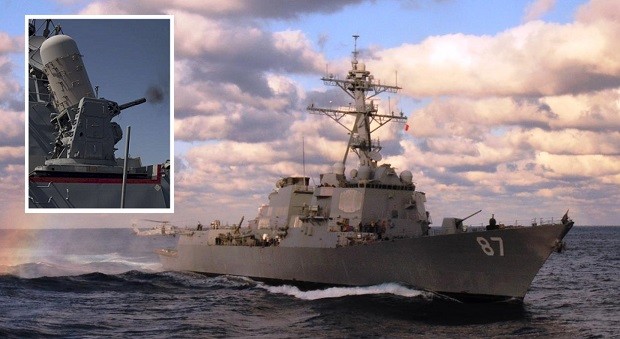
The Pentagon said on Wednesday that the USS Mason, a guided-missile destroyer, was again targeted with a missile from a rebel-held position in Yemen. Inset shows one of the close-in weapon systems of the Mason which can shoot down oncoming planes and missiles. PHOTOS FROM USS MASON DDG 87 FACEBOOK PAGE
WASHINGTON, United States — A US destroyer has for the second time in four days been targeted by a missile fired from rebel-held territory in Yemen, the Pentagon said Wednesday.
The USS Mason detected at least one incoming missile around 6:00 pm local time (1500 GMT) and deployed unspecified “countermeasures” before the missile crashed into the ocean, though it was unclear if these actions caused the missile to hit the water, or if it would have gone down anyway.
READ: US eyes retaliation for missile attack on US warships off Yemen | Iranian navy in ‘unsafe’ intercept of US destroyer — official
“There was no damage to the ship or its crew. USS Mason will continue its operations,” Pentagon press secretary Peter Cook said.
The Mason was conducting routine operations in international waters off the Red Sea coast of Yemen, meaning it was at least 12 nautical miles (22 kilometers) out to sea.
The attack saw a “coastal defense cruise missile” fired from a Huthi-controlled area south of Al-Hudaydah, a US defense official said.
“There was no damage to the ship or its crew. USS Mason will continue its operations,” Pentagon press secretary Peter Cook said.
On Sunday, two missiles fired from rebel-held territory in Yemen again fell short of the Mason, and the Pentagon has said it is willing to retaliate for the attacks.
“We will respond to this threat at the appropriate time and in the appropriate manner,” Cook said.
US Chief of Naval Operations Admiral John Richardson added the attacks were “serious” but would not hamper operations.
“We are trained and ready to defend ourselves and to respond quickly and decisively,” he said.
Attack on funeral
The United States is backing a Saudi-led coalition fighting the Iran-backed Huthi rebels and the forces of former Yemeni president Ali Abdallah Saleh.
The US military provides intelligence and air-refueling for Arab coalition aircraft conducting air strikes against the rebels. It also supplies advanced munitions and logistics support to the Saudi-led war effort, and is the kingdom’s biggest arms supplier.
But US air forces are not directly involved in strikes in Yemen, which are increasingly criticized by the international community for their devastating impact on civilians.
Coalition warships have imposed a naval blockade on rebel-held ports along Yemen’s Red Sea coast allowing in only UN-approved aid shipments.
After a deadly air strike by the Saudi-led coalition Saturday on a funeral in Yemen killed more than 140 people, the US administration announced an “immediate review” of its cooperation.
The Riyadh-led coalition fighting the Huthis has accused rebels of firing a ballistic missile towards the southwestern Saudi city of Taif, hundreds of kilometers (miles) from the Yemeni border.
The incidents come after the United Arab Emirates, a key member of a Saudi-led coalition, said last Wednesday that Yemeni rebels struck a “civilian” vessel in the strategic Bab al-Mandab waterway, wounding crewmen.
That attack, conducted October 1, was claimed by the Shiite rebels.
Coalition warships have imposed a naval blockade on rebel-held ports along Yemen’s Red Sea coast allowing in only UN-approved aid shipments.
The Huthis swept into Sanaa in September 2014 and advanced across much of Yemen, forcing the government of President Abedrabbo Mansour Hadi to flee.
The conflict has killed more than 6,700 people — almost two-thirds of them civilians — and displaced at least three million since the coalition launched military operations, according to the United Nations. CBB